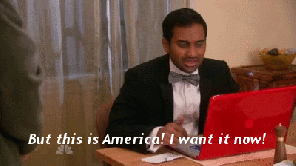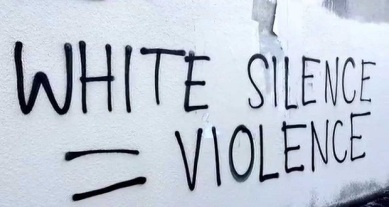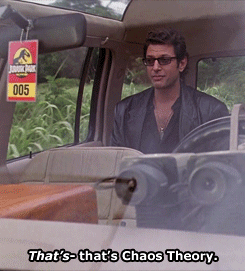Author’s note: The following reflection on discomfort stems from the alumni discussion the Women’s Center hosted as an introduction to Critical Social Justice keynote speaker Deanna Zandt. Throughout the day, Deanna, Yoo-jin, Susie, and I often discussed the need to contemplate feelings of discomfort that stem from uncertainty. Thank you for that inspiring and necessary conversation, friends. Let’s continue that momentum.
Over this semester, one of my mantras has been “sit with discomfort.” This has meant sitting without clear or particularly good answers for very desperate, hurt people turning to me for help and support. It’s meant holding space for tense and harmful conversations that I really don’t want to have with students. It has meant feeling inconsolably angry with a best friend. And it’s meant not having a dryer for two months. Nope, none of those things feel good, but being able to slow down and contemplate a state of anxiety has allowed me to reach new levels of knowledge, awareness, and perspective.
 Privilege and modern amenities (oft-begotten through privilege) enable us to reap the reward of instant gratification and it acculturates us to diminish all discomfort at its onset. Think about when you text your crush. You send something to this cutie asking them about their astrological sign or if they’ve seen that one Vine (RIP 6 seconds of perfection), and then you wait. You wait and you wait and you wait for their response. Sometimes you get that awful read receipt and no response or you get that blinking ellipsis and nothing. So you check your phone for any twitch or tiny breath of a ding obsessively for the next hour. That feeling? That right there is discomfort and we want that to be alleviated desperately, because–oh my god–what if she’s ALSO a pisces and we’re just going to cry a lot together in the future?
Privilege and modern amenities (oft-begotten through privilege) enable us to reap the reward of instant gratification and it acculturates us to diminish all discomfort at its onset. Think about when you text your crush. You send something to this cutie asking them about their astrological sign or if they’ve seen that one Vine (RIP 6 seconds of perfection), and then you wait. You wait and you wait and you wait for their response. Sometimes you get that awful read receipt and no response or you get that blinking ellipsis and nothing. So you check your phone for any twitch or tiny breath of a ding obsessively for the next hour. That feeling? That right there is discomfort and we want that to be alleviated desperately, because–oh my god–what if she’s ALSO a pisces and we’re just going to cry a lot together in the future?
We want to alleviate discomfort at its onset and this whole feeling has been altogether alleviated by modern privileges like Amazon’s instant delivery service, Netflix’s extensive library, and the ability to get on the internet from any phone ever.
But–and hear me out–what if we didn’t always get what we wanted? What if your crush never texts back? Or what if they do text back, but in the moments where you feel discomfort you’re also being reflective about what’s going on for you?
Perhaps, in the case of your crush, you need to ask yourself why their reply is so important. Will it add value to yourself? Will it validate the feelings you have? Does it mean anything besides that fact that they were also born arbitrarily under the symbol of two fish?
Now I’m not saying all of this with the purpose of requesting that you deprive yourself of the simple pleasures of life like watching every single episode of We Bare Bears. Do that. If it makes you happy, do that. And totally feel the anxiety related to sending texts to your crush (you’re fine, a good person, you’re great, there are plenty of fish in the sea, yadda, yadda, yadda).
Rather, what I’m saying is that discomfort is a signal that I think we can pay more attention to because it designates a path for learning, catharsis, and/or growth. Not every moment of discomfort, but there are many discomforting moments, especially as we navigate a world that is not always made for us. Given that, discomfort is and can be a great teacher.
Discomfort as integral to social justice work
There are certain pieces of social justice work that just require sitting with discomfort and having the patience to slow down and not leap for the nearest possible resolution.
The root feeling of discomfort is fear. And fear is what drives prejudice. Ipso facto oppression thrives on fear-induced snap judgments. In order to unlearn the fear that we are programmed to associate with difference, we must recognize discomfort, identify the root of it, and address it. When we slow down fear and face it, yeah, it feels bad, but we are then able to start the process of changing our minds.
The following are some social justice practices and tenets that are, among many other things, predicated on uncomfortable situations.

Sarah’s Scribbles already had this GIF made so you know I’m legit.
Restorative practices
The focus of restorative practices (also “restorative justice”) is on repairing harm in a community-centered way. This looks like big circles that bring together perpetrators, victims, community advocates, and allies in a dialogue, where everyone is treated equitably. The process of doing so is, as you might imagine, riddled with discomfort materializing through very awkward and vulnerable conversations. Fundamentally, those deep and often hard questions allow us to reach for the context in the story that can help us come to empathy, generosity, and creating dynamic resolutions.

We might get into stories that involve shame or ignorance. We might be forcing a person who has done something bad to talk about that something bad to the victim. If that’s not terribly awkward, I don’t know what is; however, the cool thing about this bringing folks into an awkward feely circle is that this really works to create community-centered solutions. It works to repair harm in a way that also teaches skills to ensure that harm will not continue, and it’s a great alternative to punitive measures that often perpetuate a cycle of harm.
Cultural humility
Cultural humility is a paradigm that offers an alternative to its more popular (but less realistic) cousin, cultural competency. See, cultural competency is a means to an end founded on this idea that if we just put our minds to it and go to enough trainings, maybe we’ll understand what it is to experience racism, xenophobia, transphobia, heterosexism, anti-semitism, sexism, etc. Cultural humility, however, is predicated on process and the idea that people who are different from one another should ask more questions and be willing to admit their lack of knowledge or experience.
It’s kind of like rather than aiming to get an A in a class, you commit to lifelong learning in the subject, because you already know that there’s only so much 3 credits can train you for.
Just so, cultural humility asks us to get into situations feeling confident in the fact that we probably won’t feel confident, that we won’t always know how to move forward, and that that discomfort we’re feeling is okay. That discomfort is a key part of the process of cultural humility.
Self-care
We love to talk about self-care in the Women’s Center, but we’re also afraid that it’s become more of a buzzword and less of the radical act that Audre Lorde professes it to be. As much as we want folks, especially those who experience marginalization, to take care of themselves in the name of social justice and sustainability, we also want people to challenge themselves. It’s only through the difficult dialogues and challenging moments of life–which hit us all too often–that we are able to create paths of growth.
So maybe a conversation gets into a rough territory for you and you feel those problematic hackles starting to rise. Before you abandon ship for a very well-deserved bubble bath, maybe try to see it through? Maybe you’ll be able to see someone through a teachable moment or maybe you’ll totally fail. Either way, there’s an opportunity to learn there, and giving ourselves those moments is also a way to take care of ourselves.
Acknowledging and learning from privilege
Critical to any social justice praxis (or literally just being a good human being) is our understanding of our own privileges. Whether you’re new to this and just understanding the pervasive nature of sexism or this is old hat and you’ve been active in anti-racist work for years, this is a NEVER ENDING JOURNEY.

In order to be allies, we have to sit with the harm our privilege deals toward others. It is NEVER comfortable, and it should never be particularly cozy. We should always be asking those questions of: how much space am I taking up? Am I entitled to this? How will this action impact other people around me? Often the answers aren’t clear or flattering, but self-reflection and insight are critical to being a responsible and respectful ally.
Relationship-building and critical generosity
Relationship-building across difference is antithetical to oppression. Yeah, I said it. I’ll say it louder: RELATIONSHIP-BUILDING ACROSS DIFFERENCE IS ANTITHETICAL TO OPPRESSION. Did you say it louder?
And how do you think you grow closer to a person? CONFLICT THAT YOU SURVIVE.
Let’s go back. Remember way back at the beginning of this blogpost when I referred to being inconsolably angry with my best friend. The reason why I held onto that anger is because I knew that I needed to feel it before I could really clarify the problem that I was having with them. Once I was able to process, it made talking through this issue with my friend just a little bit easier (I definitely still cried, but hey, I’m a pisces).
I don’t condone ignoring your gut about the toxic people who definitely need to be yeet-ed up and out of your life. What I’m trying to get to is that I hope we can stick with the folks who make mistakes but who demonstrate that they’re willing to stick with us even when we respond with anger, sadness, disappointment.
Critical generosity is that step where we take a beat and open ourselves up to the realization that not everyone is as infallible as we want them to be. We withhold judgment about a person’s character and we continue to search for the humanity and the story that they’ve lived that has gotten them to the conclusion that they’ve gotten to. Some people might be beyond our time and energy, but there are many others who just need that room to fail or make an error and to be taken in with grace nonetheless.
And finally, discomfort is natural
Finally, nothing is black and white. We exist in the gray matter of the world. When we find conflict or tension or challenges, the reality is that there is no perfect answer in how to resolve that. There are complexities to each solution we try to make. We’re all trying really hard to get through and make those solutions work, but we don’t often get to anything resembling perfect. That’s why the discomfort is so important to listen to.

Discomfort is a part of slowing down and becoming more present. If we acknowledge it and pay attention to it, it means that we’re allowing energy to do what it does naturally which is conflict.
So next time someone inevitably does something that irks you, hurts your feelings, leaves you waiting on a text, and all you want is to crawl back in your shell and just drink hot cocoa and avoid avoid avoid, maybe just take a couple of breaths. Maybe they do indeed understand your “fr e sh a voca do” meme and they don’t think you’re weird. Or they do. Is that really awful?
Resolve to listen to yourself and honor the discomfort your feeling, and think about how maybe it is pointing you toward a new friend, journey, opportunity.
Further reading:
Fearology Pt. 1 with Mary Poffenroth from Alie Ward’s Ologies podcast
From Safe Spaces to Brave Spaces by Brian Arao and Kristi Clemens
Life hacks of the poor and aimless by Laurie Penny
Reflections on cultural humility by Amanda Waters and Lisa Asbill





